Ispaghol in Arabic: Meaning, Benefits, and Traditional Uses Guide
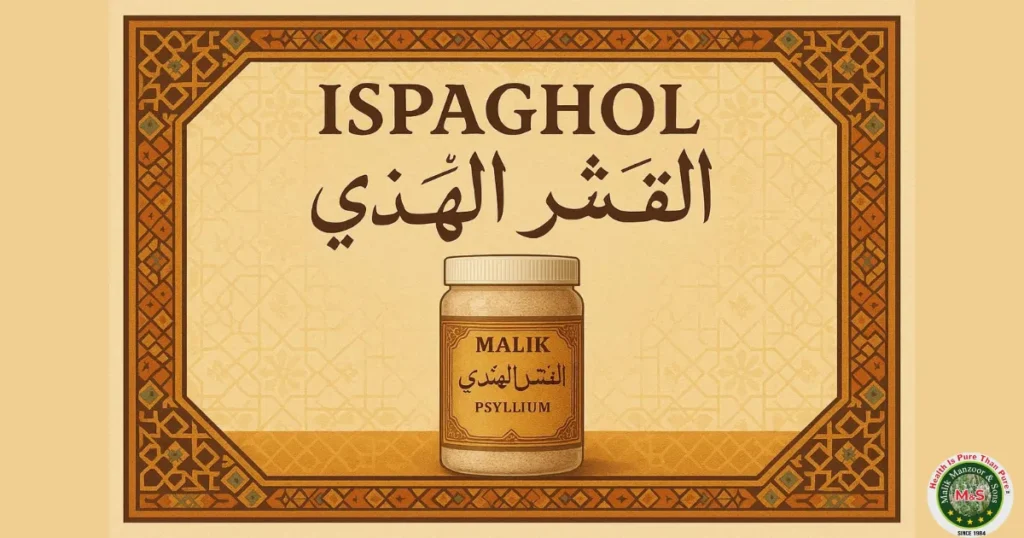
When Arabic-speaking customers from the Middle East visit my processing facility in Pakistan or order our products online, one of the first questions they ask is about the Arabic name for ispaghol. Whether you’re searching for ispaghol in Arabic to understand what you’re buying at your local herbal shop (al-attar) or you’re researching this natural remedy’s traditional uses, you’re connecting with centuries of wellness wisdom shared across Arab and South Asian cultures.
As someone who’s cultivated psyllium for over two decades and supplied it to markets across the Middle East, I’ve witnessed how ispaghol – known in Arabic regions as “Al-Qishr Al-Hindi” or “Qishr Al-Ispaghul” – has become a trusted household remedy from Saudi Arabia to Egypt. Today, let me share everything you need to know about this remarkable fiber supplement in the context of Arabic traditional medicine and modern usage.
What is Ispaghol? Understanding the Basics
Before we explore ispaghol in Arabic specifically, let me explain what this supplement actually is. Ispaghol is the Urdu/Hindi name for the husk derived from Plantago ovata seeds – a small plant we cultivate extensively in Pakistan’s semi-arid regions, particularly in Sindh and Punjab provinces.
The name “ispaghol” or “isabgol” comes from Persian, where “asp” means horse and “ghol” means ear, referring to the seed’s shape. In English, it’s called psyllium husk or simply psyllium. The scientific name, Plantago ovata, remains constant across all languages and regions.
What makes ispaghol special is its outer seed coating – the husk or “qishr” in Arabic – which contains approximately 70% soluble fiber. When this husk contacts water, it absorbs 10-14 times its weight and forms a beneficial gel. This unique property is what gives ispaghol its therapeutic value, regardless of what language you call it in.
Ispaghol in Arabic: The Correct Translation and Meaning
Now, let’s address what you came here for: what is ispaghol in Arabic?
Ispaghol in Arabic is called “Al-Qishr Al-Hindi” (القشر الهندي) or “Qishr Al-Ispaghul” (قشر الإسبغول). Let me break down these terms:
Al-Qishr Al-Hindi (القشر الهندي):
- “Al-Qishr” (القشر) means “the husk” or “the peel”.
- “Al-Hindi” (الهندي) means “the Indian,” referring to its Indian subcontinent origins.
- Together: “The Indian Husk”.
Qishr Al-Ispaghul (قشر الإسبغول):
- “Qishr” (قشر) means “husk”.
- “Al-Ispaghul” (الإسبغول) is the Arabic transliteration of “ispaghol”.
- Together: “Ispaghul Husk”.
You might also see it referred to as:
- Buthoor Al-Ispaghul (بذور الإسبغول) – “Ispaghul seeds”.
- Qishr Al-Qatuna (قشر القطونة) – Another traditional Arabic term.
- Al-Ispaghul (الإسبغول) – Simply “ispaghul”.
Here’s a quick reference table for clarity:
| Language | Name | Arabic Script |
| English | Psyllium Husk | — |
| Urdu/Hindi | Ispaghol/Isabgol | اسپغول / इसबगोल |
| Arabic | Al-Qishr Al-Hindi | القشر الهندي |
| Arabic | Qishr Al-Ispaghul | قشر الإسبغول |
| Scientific | Plantago ovata | — |
When shopping in Arabic-speaking countries like Saudi Arabia, UAE, Egypt, Jordan, or Kuwait, you can ask for any of these names at pharmacies (saydaliya) or traditional herbal shops (al-attar), and they’ll know exactly what you need.
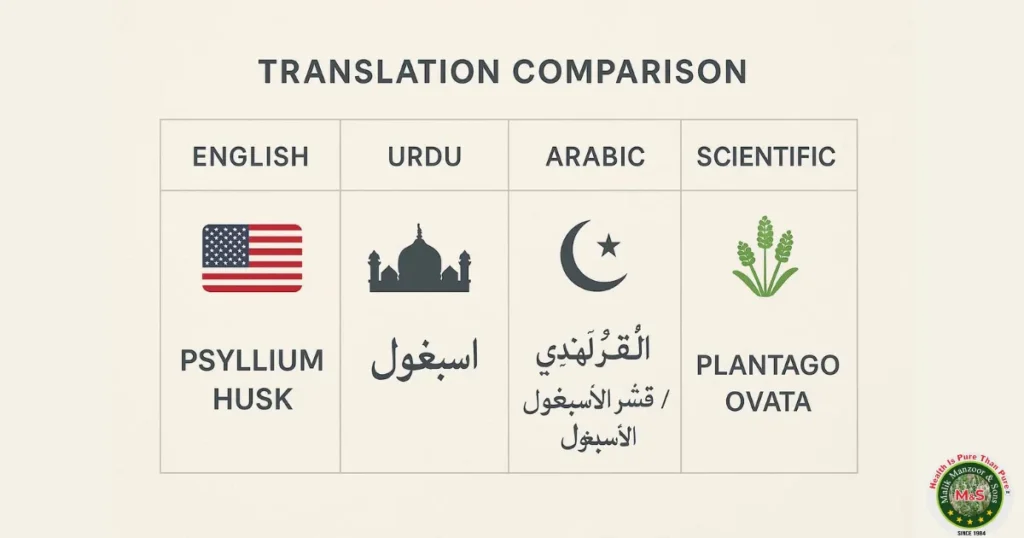
Ispaghol’s Place in Arabic Traditional Medicine.
Understanding ispaghol in Arabic context means appreciating its role in traditional Arabic and Islamic medicine (Al-Tibb Al-Nabawi). While ispaghol originated from the Indian subcontinent (Pakistan and India), it has been integrated into Arabic herbal medicine practices for centuries, particularly after trade routes connected the regions.
In traditional Arabic medicine, practitioners classify herbs based on their properties – hot, cold, dry, or moist. Ispaghol is generally considered cooling and moistening, making it valuable for conditions related to internal heat and dryness, particularly digestive issues.
Arabic herbalists (attars) traditionally recommend ispaghol for:
- Al-Imsak (الإمساك) – Constipation.
- Tanzif Al-Amaa (تنظيف الأمعاء) – Intestinal cleansing.
- Al-Hazm (الهضم) – Digestion support.
- Tanqiyat Al-Dam (تنقية الدم) – Blood purification.
- Al-Sikari (السكري) – Diabetes management.
Many Arab families, especially those practicing traditional medicine, keep ispaghol in their homes alongside other herbal remedies like black seed (habbat al-barakah), fenugreek (hulba), and senna (sana makki).
Health Benefits of Ispaghol in Arabic Medical Context.
Let me share the scientifically-validated benefits of ispaghol that align with Arabic traditional medicine understanding:

Digestive Health and Constipation Relief.
This is the primary use across the Arab world. The soluble fiber in ispaghol forms a gel that softens stool and promotes easy bowel movements – a benefit recognized in both traditional Arabic medicine and modern gastroenterology.
In Arabic medical texts, digestive health is considered foundational to overall wellness. Ispaghol’s gentle, natural action makes it preferred over harsh chemical laxatives, aligning with the Islamic medical principle of using the mildest effective treatment.
Weight Management Support.
Arabic traditional medicine has long recognized that ispaghol creates lasting fullness (al-shiba). When taken before meals with water, it expands in your stomach, helping you eat smaller portions naturally – a concept that modern science now validates through satiety studies.
For those following Ramadan fasting, some practitioners recommend ispaghol at suhoor (pre-dawn meal) to maintain digestive comfort throughout the fasting day, though this should be discussed with a healthcare provider.
Cholesterol and Heart Health.
Multiple clinical studies confirm that ispaghol lowers bad cholesterol (al-cholesterol al-darr). This is particularly valuable for Arab populations, where heart disease rates are rising due to dietary changes and lifestyle factors.
The fiber binds to bile acids, forcing your liver to use cholesterol to produce more bile, thereby reducing overall cholesterol levels – a mechanism that works regardless of language or geography.
Blood Sugar Control.
Ispaghol slows glucose absorption, preventing dangerous blood sugar spikes (irtifa al-sukkar fi al-dam). For Arab countries with high diabetes prevalence – particularly Gulf states – this natural approach to blood sugar management is increasingly recognized by endocrinologists.
Colon Cleansing and Detoxification.
Traditional Arabic medicine emphasizes internal cleansing (tanzif), and ispaghol is considered excellent for this purpose. It gently sweeps the intestinal walls, removing accumulated waste without harsh purging – a balanced approach valued in Islamic medical ethics.
Prebiotic Benefits for Gut Health.
Modern research reveals that ispaghol feeds beneficial gut bacteria, producing short-chain fatty acids that support colon health. This aligns with traditional Arabic understanding of maintaining balance (tawazun) in the body’s internal environment.
How to Use: Ispaghol in Arabic Traditional Methods.
Let me share traditional Arabic ways of consuming ispaghol, along with modern recommendations:
Basic Preparation (Al-Tahdeer Al-Asasi):
- Quantity (Al-Kamiyya): Start with 1 teaspoon (mi’ laqa saghira) – approximately 5 grams.
- Liquid (Al-Sael): Mix with at least 1 glass (ka’s) of water, milk, or laban (yogurt drink).
- Stirring (Al-Khalat): Mix thoroughly for 10-15 seconds.
- Immediate consumption (Shurb fawran): Drink before it thickens into gel.
- Additional water (Ma’ idafi): Follow with another glass of water.
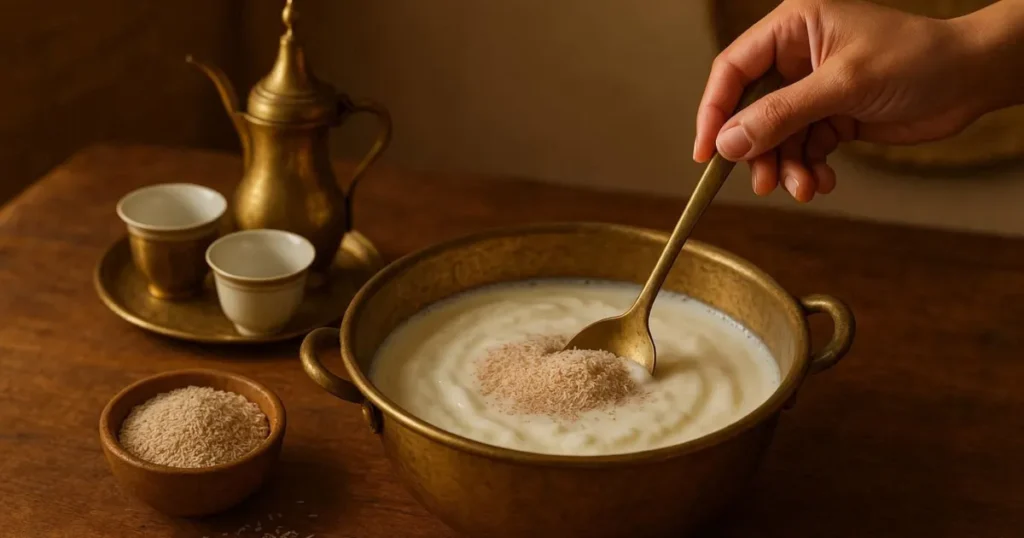
Popular Arabic Home Remedies with Ispaghol:
Ispaghol with Water:
The simplest method – mix ispaghol with room temperature or warm water and drink before bedtime. This is the most common preparation across Arab countries and provides gentle overnight relief.
Ispaghol with Laban (لبن):
Mix ispaghol with cold laban (cultured milk drink) or yogurt drink. This is particularly popular in Gulf countries and provides both probiotics and fiber – a powerful digestive combination.
Ispaghol with Honey (عسل):
Add ispaghol to warm water with natural honey. Honey is highly valued in Islamic medicine (mentioned in the Quran for its healing properties), and this combination is both therapeutic and palatable.
Ispaghol with Date Syrup (دبس التمر):
In some Arab regions, mixing ispaghol with date syrup and water creates a nutritious, fiber-rich drink. Dates are a staple in Arab diets and add natural sweetness and additional fiber.
Ispaghol with Rose Water (ماء الورد):
Some traditional practitioners recommend mixing ispaghol with rose water for cooling properties, particularly for those with excess body heat (harara), according to Arabic medicine principles.
Timing Recommendations:
- For constipation (al-imsak): Before sleeping at night.
- For weight management: 20-30 minutes before meals.
- For diabetes (al-sikari): With meals to slow sugar absorption.
- For cholesterol: With or after meals.
- For general digestive health: Evening after dinner.

Dosage Guidelines for Arabic-Speaking Users.
Understanding proper dosage of Ispaghol in Arabic is important for safety and effectiveness:
Adults (Al-Balegheen):
- Starting dose: 1/2 to 1 teaspoon once daily.
- Maintenance dose: 1-2 teaspoons daily.
- Maximum: 3 teaspoons daily, divided into doses.
- Always with at least 8 ounces (240 ml) of liquid.
Children (Al-Atfal):
- Ages 6-12: Half the adult dose.
- Under 6: Only with pediatrician approval.
- Always supervise to ensure adequate water intake.
Elderly (Kibar Al-Sin):
Start with smaller doses and ensure proper hydration throughout the day, as older individuals may be more prone to dehydration.
Critical Rule: Always take ispaghol with adequate liquid. In Arabic medical tradition, proper hydration (tarteeb) is emphasized, and this is essential when using ispaghol.
Side Effects and Precautions (Al-Athar Al-Janbiyya).
While ispaghol is generally safe (amen), Arabic-speaking users should understand these precautions:
Common Initial Effects:
- Stomach gas (ghazat fi al-meda) – Usually resolves within one week.
- Bloating (intifahkh) – Temporary as your body adjusts.
- Mild cramping (tamasulat khafifa) – Often indicates insufficient water.
Who Should Avoid (Man Yajib Tajannub):
- Those with intestinal blockage (insidad al-amaa).
- People with difficulty swallowing (suuba fi al-bala).
- Those with a known allergy to psyllium.
Medication Interactions:
Take ispaghol at least 2-4 hours apart from medications, especially:
- Diabetes medicines (adwiyat al-sikari).
- Heart medications (adwiyat al-qalb).
- Thyroid medicines (adwiyat al-ghudda al-darqiyya).
Pregnancy (Al-Haml):
Generally safe during pregnancy for constipation relief, but always consult your doctor (tabib) first. Many Arab gynecologists specifically recommend it for pregnancy-related constipation.
Important Safety Note: Never consume ispaghol powder dry (jaf). Always mix with adequate liquid. Dry ispaghol can swell in the throat and create a choking hazard – a safety point emphasized in both traditional and modern medical guidance.
Where to Buy Ispaghol in Arabic Countries.
For Arabic-speaking customers, ispaghol is available throughout the Middle East and North Africa:
Pharmacies (Al-Saydaliya):
Major pharmacy chains and local pharmacies stock ispaghol. Ask for “qishr al-ispaghul” or simply “ispaghol.”.
Traditional Herbal Shops (Al-Attar):
Attars always carry ispaghol as it’s a staple remedy. These shops often have higher quality, additive-free options and knowledgeable staff familiar with traditional uses.
Supermarkets:
Large supermarkets in Saudi Arabia, UAE, Egypt, and other Arab countries stock ispaghol in the health section. Look for it near other dietary supplements.
Online Retailers:
Websites serving Arab markets deliver throughout the region. This is convenient for comparing brands and reading Arabic-language reviews.
Quality Indicators:
Whether the package says “Al-Qishr Al-Hindi” in Arabic or “Psyllium Husk” in English, look for:
- Light beige to white color.
- Fine, uniform texture.
- Good swelling capacity when mixed with water.
- Proper certification and expiration dates.
- Reputable brand names.
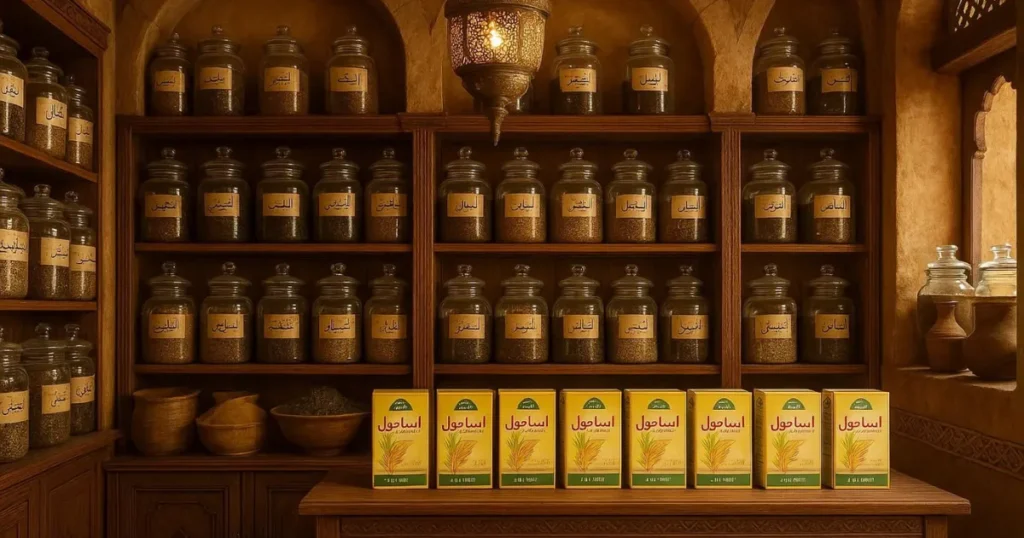
At Malik Psyllium, we export to distributors throughout the Arab world, ensuring consistent quality whether the package is labeled in Arabic, English, or Urdu.
Ispaghol in the Islamic Medicine Context.
It’s worth noting that while ispaghol itself isn’t specifically mentioned in classical Islamic medical texts (it being native to Pakistan and India), its use aligns perfectly with Islamic medical principles (usul al-tibb al-islami):
Natural Remedies Preference:
Islamic medicine emphasizes using natural substances before synthetic options – ispaghol fits this principle perfectly.
Gentleness (Al-Rifq):
The Prophet Muhammad (peace be upon him) emphasized gentleness, and ispaghol’s gentle action on the digestive system reflects this value.
Prevention (Al-Wiqaya):
Islamic medicine stresses prevention over cure. Regular ispaghol use for digestive maintenance embodies this preventive approach.
Balance (Al-Tawazun):
Maintaining bodily balance is central to Islamic medicine, and ispaghol helps balance digestive function without forcing or depleting.
Many contemporary Islamic medicine practitioners (including those trained in prophetic medicine, Al-Tibb Al-Nabawi) now incorporate ispaghol into their treatment protocols for digestive health.
Comparing Ispaghol to Other Arabic Herbal Remedies.
Arabic-speaking users often ask how ispaghol compares to other traditional remedies:
Ispaghol vs Senna (Sana Makki):
Both relieve constipation, but senna is a stimulant laxative that can be harsh with regular use. Ispaghol is gentler and suitable for long-term use. For chronic constipation, ispaghol is preferred.
Ispaghol vs Fenugreek (Hulba):
Both are natural and beneficial, but they serve different primary purposes. Fenugreek is used more for lactation, inflammation, and blood sugar. Ispaghol is specifically for fiber and digestive bulk.
Ispaghol vs Flaxseed (Buthoor Al-Kataan):
Both provide fiber, but ispaghol has superior gel-forming properties and is more effective for constipation. Flaxseed provides omega-3 fats that ispaghol doesn’t have.
Ispaghol vs Wheat Bran (Nukhalat Al-Qamh):
Ispaghol is gentler and gluten-free. For those with gluten sensitivity or celiac disease (common in some Arab populations), ispaghol is the better choice.
What is ispaghol called in Arabic?
Ispaghol in Arabic is called “Al-Qishr Al-Hindi” (القشر الهندي) or “Qishr Al-Ispaghul” (قشر الإسبغول). “Qishr” means husk, and these terms refer to the same psyllium husk fiber supplement derived from Plantago ovata seeds. You can use either name when shopping in Arab countries.
What is the Arabic meaning of psyllium husk?
Psyllium husk in Arabic translates to “Al-Qishr Al-Hindi” (the Indian husk) or “Qishr Al-Ispaghul” (ispaghul husk). It’s a natural fiber supplement used in traditional Arabic medicine for digestive health, constipation relief, and internal cleansing. The Arabic name emphasizes its origin from the Indian subcontinent (Pakistan and India).
How do you use ispaghol for constipation in Arabic medicine?
Mix 1 teaspoon of ispaghol (qishr al-ispaghul) in a glass of water, laban, or warm milk. Stir thoroughly and drink immediately before it thickens. Follow with another glass of water. Take before bedtime for morning relief. This method is used throughout the Arab world and provides gentle, natural constipation relief.
Can I take ispaghol daily?
Yes, ispaghol is safe for daily long-term use when taken with adequate water. Many people in Arab countries use it daily as part of their wellness routine. Start with a small dose (1/2 teaspoon) and gradually increase to 1-2 teaspoons daily. Maintain 2-4 hour spacing from medications.
Is ispaghol the same as psyllium husk?
Yes, exactly the same. “Ispaghol” is the Urdu/Hindi name, “psyllium husk” is the English name, and “Al-Qishr Al-Hindi” or “Qishr Al-Ispaghul” is the Arabic name. All refer to the fiber-rich husk from Plantago ovata seeds. The product is identical regardless of language.
Where can I buy ispaghol in Arabic countries?
Ispaghol is widely available in Arab countries at pharmacies (saydaliya), traditional herbal shops (al-attar), large supermarkets, and online retailers. Ask for “qishr al-ispaghul” or “al-qishr al-hindi.” It’s commonly stocked in Saudi Arabia, the UAE, Egypt, Jordan, Kuwait, and throughout the Middle East.
What are the side effects of ispaghol?
When taken with adequate water, side effects are minimal. Initially, some people experience mild gas or bloating that resolves within a week. Without enough water, it can worsen constipation. Rare allergic reactions can occur. Always take with at least 8 ounces of liquid and increase water intake throughout the day.
Is ispaghol good for weight loss?
Yes, ispaghol supports weight management by creating lasting fullness. Take it 20-30 minutes before meals with plenty of water. It expands in your stomach, helping you eat less naturally. Many people in Arab countries use it for weight control, but it works best combined with healthy eating and regular exercise.
Conclusion: Embracing Ispaghol in Arabic Wellness.
Understanding ispaghol in Arabic – both the name (Al-Qishr Al-Hindi or Qishr Al-Ispaghul) and its applications – connects you to a time-tested natural remedy that bridges South Asian and Arab traditional medicine. Whether you’re managing constipation (al-imsak), supporting weight loss, controlling blood sugar (al-sikari), or maintaining overall digestive health (al-hazm), ispaghol offers gentle, effective support rooted in natural wellness principles.
As someone who cultivates Plantago ovata in Pakistan’s ideal growing conditions and supplies it to markets throughout the Arab world, I’m proud that our ispaghol reaches Arabic-speaking communities from Riyadh to Cairo. At Malik Psyllium, we maintain rigorous quality standards to ensure the ispaghol you purchase – whether labeled in Arabic, English, or Urdu – meets the highest purity and effectiveness benchmarks.
I encourage Arabic-speaking families to embrace this natural fiber supplement as part of your wellness routine, combining traditional herbal wisdom with modern scientific understanding for optimal health benefits. The key is consistency, adequate hydration, and choosing quality products from trusted sources.
Malik Shabbir
Featured Blogs
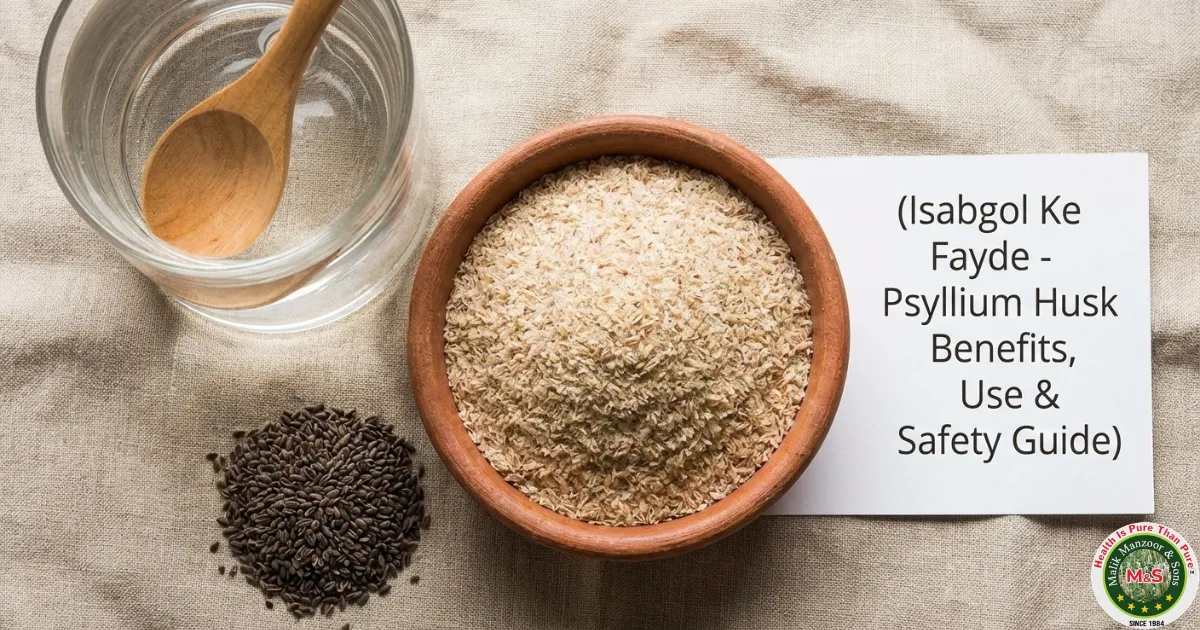
Isabgol Ke Fayde – Psyllium Husk Ke Poori Science-Based Rahnumayi – 2026
Isabgol ke fayde jaanna aaj ke daur mein zyada zaroori
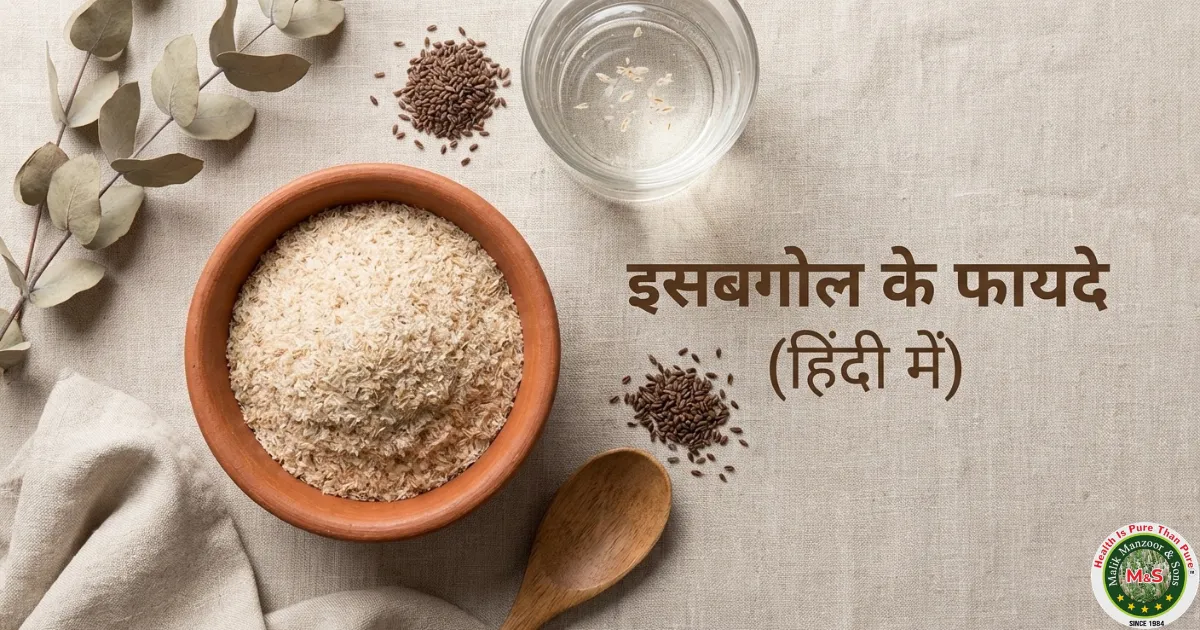
Isabgol Benefits in Hindi | Psyllium Husk Ke Fayde, Sahi Upyog Aur Savdhaniyan – 2026
Agar aap isabgol benefits in hindi mein samajhna chahte hain,
